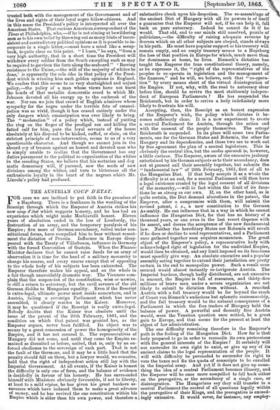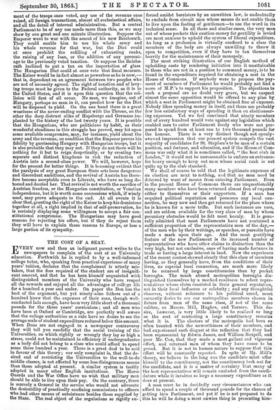THE AUSTRIAN COUP D'ETAT.
FOR once we are inclined to put faith in the promises of r a Hapsburg. There is a frankness in the wording of the Rescript through which the Emperor of Austria strikes his new coup d' itat which suggests honesty, and he has had an experience which might make Machiavelli honest. Eleven years of absolutism ended in the loss of Lombardy, the destruction of an army, and the temporary paralysis of his Empire ; five more of German ascendancy, veiled under con- stitutional forme, have compelled him to bear without resent- ment the dictation of Prussia. Influence in Europe disap- peared with the Treaty of Villafranca, influence in Germany with the forced Convention of Gastein. When the Finance Minister declares that he cannot raise funds for an army of observation it is time for the head of a military monarchy to change his course, and every course except that of appealing to the whole body of his subjects has been exhausted. The Emperor therefore makes his appeal, and on the whole in a fair though unavoidably dramatic way. The Viennese com- plain that the suspew.ion of the constitution, wise or unwise, is still a return to autocracy, but the cavil savours of the old German dislike to Hungarian equality. Even if the Rescript is extra-legal, ultimate power must reside somewhere, and in Austria, failing a sovereign Parliament which has never assembled, it clearly resides in the Kaiser. Moreover, it may be questioned if the Rescript is really extra-legal. Nobody doubts that the Kaiser was absolute until the issue of the patent of the 26th February, 1861, and the condition on which that patent was granted has, as the Emperor argues, never been fulfilled. Its object was to secure by a great concession of power the homogeneity of the Empire, and it has not secured it. The representatives of Hungary did not come, and until they came the Empire re- mained as disunited as before, united, that is, only by an en- forced obedience to the sovereign of each part. That is not the fault of the Germans, and it may be a little hard that the penalty should fall on them, but a lawyer would, we conceive, hold that the right of independent action still lay with the Imperial Government. At all events, if the Kaiser is honest the difficulty is only one of form, and the balance of evidence is decidedly in favour of his honesty. He has surrounded himself with Ministers obviously favourable, if not to liberty, at least to a mild regime, he has given his great bankers as- surances which have induced them to make a great advance of money, and he has revived the one constitution within his Empire which is older than his own power, and therefore a substantive check upon his despotism. The re-assemblage of the ancient Diet of Hungary with all its powers is of itself a guarantee that the Emperor will not, if he can help it, fall back on pure autocracy. Indeed he cannot do it if he- would. That old, and to our minds still unsolved, puzzle of politicians,—the difficulty of raising adequate revenue by decrees which on all other subjects are obeyed, stands always. in his path. He must have popular support or his treasury will remain empty, and an empty treasury means to a Hapsburg the loss of that position in Europe for which, much more than for dominance at home, he lives. Bismark's dictation has. taught the Emperor the true constitutional theory, namely, as he expresses it, the "right of the representatives of the peoples to co-operate in legislation and the management of the finances," and he will, we believe, seek that " co-opera- tion" by every means short of the virtual disintegration of the Empire. If not, why, with the road to autocracy clear before him, should he revive the most stubbornly indepen- dent of European Parliaments ? He has suspended the Reiohsrath, but in order to revive a body indefinitely more likely to frustrate his will.
Accepting, then, the Rescript as an honest expression. of the Emperor's wish, the policy which dictates it be- comes sufficiently clear. It is a new experiment to create- a central Parliament for Austria, through the action and with the consent of the people themselves. The octroyi Reicharath is suspended. In its place will come two Parlia- ments, one for the German States and Bohemia, the other for Hungary and its dependencies, and these two are to work out- by free agreement the plan of a central legislature. This is obviously the central idea, but the modus operandi is, however,. a little curious. The Emperor, aware of the excessive jealousy entertained by his German subjects as to their ascendancy, does not at present call their assembly together, but submits the " fundamental law" of 26th February, 1861, first of all to the Hungarian Diet. If that body accepts it as a whole the difficulty is at an end, for a central Parliament will then have a legal existence created by the legal consent of all divisions of the monarchy,—will in fact within the limit of its fano-. tions be as strong as our own. If, on the other hand, as is quite certain, the Diet demand alterations in the patent, the Emperor, after a compromise with them, will submit the- revised patent, i. e., a new constitution to the German Assembly. He can influence that in a way in which he cannot influence the Hungarian Diet, for that has no history of a thousand years, or can even in the last resort dispense with its assent, and decree the acceptance of the new fundamental law. Neither the hereditary States nor Bohemia will revolt if he does or decline to send representatives, and a Parliament once gathered together soon acquires momentum. The great- object of the Emperor's policy, a representative body with acknowledged right of legislation for the undivided Empire, would then be obtained, and any limit imposed on its functions- must speedily give way. An absolute executive and a popular assembly acting together to extend their jurisdiction are pretty certain in the end to monopolize power. Such a result once secured would almost instantly re-invigorate Austria. The- Imperial burdens, though badly distributed, are not excessive in amount, the Empire is full of resources, and thirty-five- millions of brave men under a severe organization are not likely to submit to dictation from without. A. reunited. Austria with a full treasury would be far beyond the reach of Count von Bismark's audacious but splenetic statesmanship,. and the full treasury would be the natural consequence of a Parliament in which the free traders of Hungary held the balance of power. A powerful and decently free Austria would, were the Venetian question once settled, be a great gain to Europe, and that seems for the present at least the object of her administration.
The one difficulty remaining therefore in the Emperor's. path is the feeling of the Hungarian Diet. How far is that body prepared to go in order to reconcile its own pretensions with the general interests of the Empire ? It certainly will not surrender its own right to exist, or give up any of its- ancient claims to the legal representation of the people. It will with difficulty be persuaded to surrender its right to vote the taxes and fix the quota of conscripts to be enrolled in the Imperial army. And yet if it does not give up some- thing the idea of a central Parliament becomes illusory, and, the Emperor will bo once more compelled to fall back either on the prerogative, or the ascendancy of a single race, or disintegration. The Hungarians say they will transfer to a central Parliament the control of all questions legally within the prerogative of their Kings, and the prerogative is exceed- ingly extensive. It would cover, for instance, any employ- meat of the troops once voted, any use of the revenue once raised, all foreign transactions, almost all ecclesiastical affairs, and all the detail of internal administration. But a central Parliament to be of any use needs more than this, as we may show by one great and one minute illustration. Suppose the Emperor went to war with the assent of his new Reichsrath. They could enable him to use his whole army and his whole revenue for that war, but the Diet could at once prohibit the refilling of exhausting ranks, the raising of any loan, or the addition of any percent- age to the previously voted taxation. Or suppose the Reichs- rath inclined to put a tax on the importation of glass. The Hungarian Diet could at once veto that fiscal measure. The Kaiser would be in fact almost as powerless as he is now,— that is, dependent on an agreement between two peoples who are not of necessity agreed. The right of taxation and of levy- ing troops must be given to the Federal authority, as it is in the United States, and it is upon this question that the col- lision will first of all occur. No man, we imagine, out of Hungary, perhaps no man in it, can predict how far the Diet, will be disposed to yield. On the one hand there is a great weariness of the never-ending conflict with the Throne, on the other the deep distrust alike of Hapsburgs and Germans im- planted by the history of the last twenty years. It is possible that the Hungarians, who are politicians by habit, as their wonderful steadiness in this struggle has proved, may hit upon some available compromise, may, for instance, yield about the army and the revenue, on condition that the Emperor proves his fidelity by garrisoning Hungary with Hungarian troops, but it is also probable that they may not. If they do not there will be nothing for it but to reign despotically, or by creating two separate and distinct kingdoms to risk the reduction of Austria into a second-class power. We will, however, hope for the present for better things. It is becoming evident that the paralysis of any great European State sets loose dangerous and discordant ambitions, and the revival of Austria has there- fore become acceptable even to Liberals, who have so long de- tested and decried her. That revival is not worth the sacrifice of Austrian freedom, or the Hungarian constitution, or Venetian independence, but it is worth some concessions which, if wisely used, may prove adequate to the end. At all events it is clear that, granting the right of the Kaiser to keep his dominions together at all, a right implied in that of self-preservation, he is certainly displaying some willingness to accept a fair con- stitutional compromise. The Hungarians may have good reasons for rejecting his offers, but if they do reject them they will have to explain those reasons to Europe, or lose a large portion of its sympathy.































 Previous page
Previous page